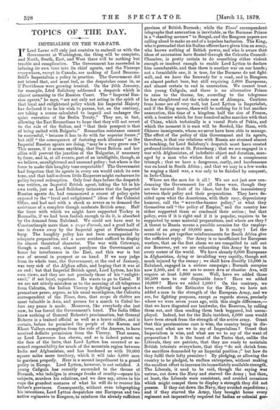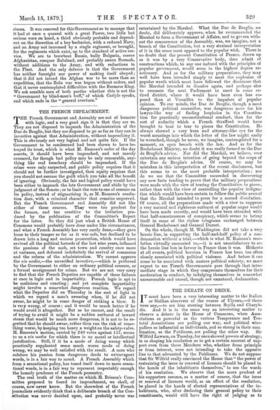TOPICS OF THE DAY.
IMPERIALISM ON THE WAR-PATH.
IF Lord Lorne will only just contrive to embroil us with the Government at Washington, the thing will be complete, and North, South, East, and West there will be nothing but trouble and complication. The Government has succeeded in infusing its own tone into its chief agents, and the Viceroys everywhere, except in Canada, are making of Lord Beacons- field's Imperialism a policy in practice. The Government did not intend that, and must feel, as the despatches come in, as if Providence were growing ironical. On the 26th January, for example, Lord Salisbury addressed a despatch which is almost menacing to the Russian Court. The "Imperial Rus- sian agents," he says, "are not only not acting in the spirit of that loyal and enlightened policy which his Imperial Majesty has declared it to be his wish to pursue, but, on the contrary, are taking a course calculated to imperil and endanger the quiet execution of the Berlin Treaty." They are, in fact, allowing the East Roumelians to hope that they will not revert to the rule of the Sultan, and "that their prospect is that of being united with Bulgaria." Roumelian resistance cannot be successful, "because it has to do with far superior forces ;" but still "the consequence of fostering such illusions" as the Imperial Russian agents are doing, "may be a very grave one." This means, if it means anything, that Great Britain and her allies will prevent the junction of the Bulgarias, if necessary by force, and is, at all events, part of an intelligible, though, as we believe, unenlightened and unsound policy ; but where is the force to make this haughty tone respectable? The Government had forgotten that its agents in every sea would catch its own tone, and that half-a-dozen little Emperors might embarrass its policy beyond redemption. Only four days before the despatch was written, an Imperial British agent, taking the bit in his own teeth, just as Lord Salisbury intimates that the Imperial Russian agents do, had commenced a course of policy quite opposed to the "loyal and enlightened" ideas of the Colonial Office, and had met with a check so severe as to demand the assistance of a complete though moderate British army. Half the force with which we might have supported Turkey in Roumelia, if we had been foolish enough to do it, is absorbed by the demand from Zululand. We could not have sent to Constantinople more than a corps d'armie, and a good half of one is drawn away by the Imperial agent at Pietermaritz- burg. The haughty policy has not been accompanied by adequate preparation, and a mere accident sufficed to display its almost theatrical character. The war with Cetewayo, though a small one, almost paralyses the Government at home for interference in the East, and this war is but one of several in prospect or on hand. If we may judge from its whole tone, the Government, at the end of January, was very sick of the Afghan affair, and hoping that it was at an end ; but that Imperial British agent, Lord Lytton, has his own views, and they are not precisely those of his " enlight- ened," if not loyal, superiors. He wants to go to Cabul. If we are not utterly mistaken as to the meaning of all telegrams from Calcutta, the Indian Viceroy is fighting hard against a premature peace, argues, as his usual mouthpiece, the Calcutta correspondent of the Times, does, that coups de the'dtre are most valuable in Asia, and presses for a march to Cabul be- fore any peace is made. Moreover, like everybody else just now, he has forced the Government's hand. The India Office knew nothing of General Roberts's proclamation, but General Roberts is a trained official as well as a brave soldier, and is certain, before be promised the people of the Kurum and Khost Valleys exemption from the rule of the Ameers, to have received definite permission from the Viceroy. That means, as Lord Lawrence has shown, and as is indeed patent on the face of the facts, that Lord Lytton has annexed or as- sumed responsibility for much of the mountain region between India and Afghanistan, and has burdened us with 70,000 square miles more territory, which it will take 5,000 men to garrison properly. Here is a second impediment to a grand policy in Europe. Lord Lytton, however, is not satisfied. A young Caligula has recently succeeded to the throne of Burmah, who indulges in strange freaks of cruelty—spears his subjects, mufflers his relations, and we dare say, utters in his cups the grandest menaces of what he will do to recover his father's provinces. Consequently, without even telegraphing his intentions, Lord Lytton despatches one European and two native regiments to Rangoon, to reinforce the already sufficient garrison of British Burmah ; while the Times' correspondent telegraphs that annexation is inevitable, as the Burmese Prince is a "standing menace" to Bengal, and the Rangoon papers are calling aloud to make an end of a hopeless barbarian. The King,. who is persuaded that his Italian officers have given him an army, who knows nothing of British power, and who is aware that ideas of annexation have floated through the Calcutta Council- Chamber, is pretty certain to do something either violent enough or insolent enough to enable Lord Lytton to declare him unendurable, and then there is another war on our hands ; not a formidable one, it is true, for the Burmese do not fight well, and we have the Irrawady for a road, and in Rangoom an almost perfect base, but still requiring 5,000 Europeans, and almost certain to end in annexation. We cannot trust , this young Caligula, and there is no alternative Prince to raise to the throne, for, according to the telegrams. he has slaughtered out the whole race of Alompra. Cautions. from home are all very well, but Lord Lytton is Imperialist,. and if the King moves, there will be nothing for it but another annexation, this time of a kingdom half the size of France,. with a frontier which for four hundred miles marches with that of China, which technically is a vassal State of Pekin, and. which the moment it is ours will be flooded, like Siam, with Chinese immigrants, whom we never have been able to manage. The effect of the policy of this Government and its agents, therefore, is that our relations with Russia are strained almost to breaking, for Lord Salisbury's despatch must have created profound irritation at St. Petersburg ; that we are engaged in a. war with Afghanistan, of indefinite object and duration, man- aged by a man who wishes first of all for a conspicuous triumph ; that we have a dangerous, costly, and burdensome war on hand in South Africa ; and that we may in a few -weeks. be waging a third war, a war only to be finished by conquest, in Indo-China.
Where are the men for it all ? We are not just now con- demning the Government for all these wars, though they are the natural fruit of its ideas, but for the inconsistency between their policy and their preparations. They have de- cided upon what the Americans, with their racy, depreciatory humour, call the "wave-the-banner policy," or what they themselves call "the policy of Empire," and the country has either supported them or condoned their action ; but that policy, even if it is right and if it is popular, requires to be supported by some material preparations, and where are they r A threat to Russia means a possible occasion for the employ- ment of an army of 50,000 men. Is it ready ? Let the scramble to get together reinforcements for South Africa give the sufficient reply. Our Army is so insufficient for European warfare, that on the first alarm we are compelled to call out our Reserves, yet we are exhausting this Army by wars in every corner of the world. We have already 8,000 Europeans. in Afghanistan, dying or invaliding very rapidly, though not much injured by the enemy ; we shall have directly 15,000 in Zululand, engaged in a serious campaign ; Burmah occupies now 2,500, and if we are to annex Ave or chastise Ava, will require at least 5,000 more. Well, have we added those 30,500 men to our disposable force ? Have we added 10,000? Have we added 1,000? On the contrary, we have reduced the Estimates for the Navy, we have not added a man to the strength of the European Army, and we are, for fighting purposes, except as regards stores, precisely where we were seven years ago, with this single difference,— that we have disgusted our landwehr, the Reserves by calling them out, and then sending them back beggared, unem- ployed. Indeed, but for the Zulu incident, 4,000 men would have been struck from the strength of the active army. Grant that this parsimonious care is wise, the country being in dis- tress, and what are we to say of Imperialism ? Grant that Imperialism is wise, and what are we to say of the want of preparation ? It is the boast of the Tories that, unlike the Liberals, they are patriots, that they are ready to maintain British interests everywhere, that they "do not shrink from. the sacrifices demanded by an Imperial position ;" but how do they fulfil their lofty promises ? By pledging, or allowing the country to be pledged, to endless enterprises, without making the smallest effort to increase its immediately available strength. The Liberals, it used to be said, though the saying was untrue, cut down the Navy and starved file Army ; but then, at least, the Liberals were consistent, and avoided occasions which might compel them to display a strength they did not possess. If they cut down the Navy, they avoided expeditions ; and if they starved the Army, they brought home every regiment not imperatively required for Indian or colonial gar. risons. It was reserved for this Government so to manage that it had at once a quarrel with a great Power, two little but serious wars on hand, a third obviously probable and depend- ent on the discretion of a boy barbarian, with a reduced Navy, and an Army not increased by a single regiment, or brought, for the regiments which exist, up to the standard of active ser- vice. We are to browbeat Russia, bully Bulgaria, coerce Afghanistan, conquer Zululand, and probably annex Burmah, without additions to the Army, and with reductions in the Fleet. And the only defence is that the Government has neither foresight nor power of making itself obeyed ; that it did not intend the Afghan war to be more than an expedition, that the Zulu war was begun without orders, and that it never contemplated difficulties with the Burmese King. We ask sensible men of both parties whether this is not the "Government by blind-man's buff," of which Carlyle speaks, and which ends in the "general overturn."



































 Previous page
Previous page